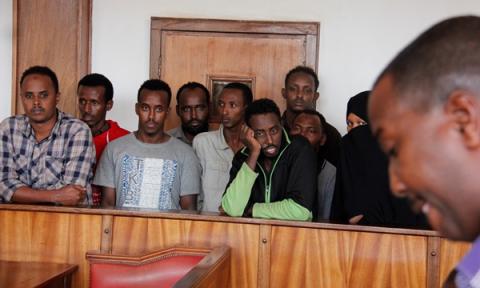
By Michael Kigozi
Parading of suspects is a common sight at Uganda's Police stations,
including the Central Police in Kampala where the top Police officers sit.
Its is quite surprising because the Ugandan Constitution, the supreme
legal instrument in the land presumes suspects to be innocent until they
are proved guilty.
According to the constitutional article 28 sub section 3, every person who
is charged with a criminal offence shall be presumed to be innocent until
proved guilty or until that person has pleaded guilty.
The Foundation for Human Rights Initiative as quoted in the *uganda radio
network *of 13th January 2009 once described the move as a populist scheme
that demonstrates the inefficiency of the force.
Judith Nabakooba, the Police Spokesperson at the time is also quoted in the
same forum arguing that parading suspects is intended to restrain the
public from committing crime.
Executive Director Foundation for Human Rights Initiatives Livingstone
Sewanyana says that contrary to the police argument, parading suspects
before the public can pre-empt criminal investigations because the would be
accomplices are alerted.
.
Ladislaus Rwakafuzi, a Human Rights Advocate says that parading suspects
before the public is a desperate measure by the police which is in the
limelight as an incompetent force.
Rwakafuzi says parading suspects puts their lives in danger and subjects
them to psychological torture in instances where they are wrongly accused.
Rwakafuzi, like many other Human Rights defenders notes that a suspect can
invoke Constitutional safeguards to seek for Court damages. He however
argues that seeking Court redress will not heal the psychological torture
inflicted on the suspect.
Therefore there are arguments for and against the practice continue to rage.
The author is an MA student at the Department of Journalism and Communication
- Log in to post comments




